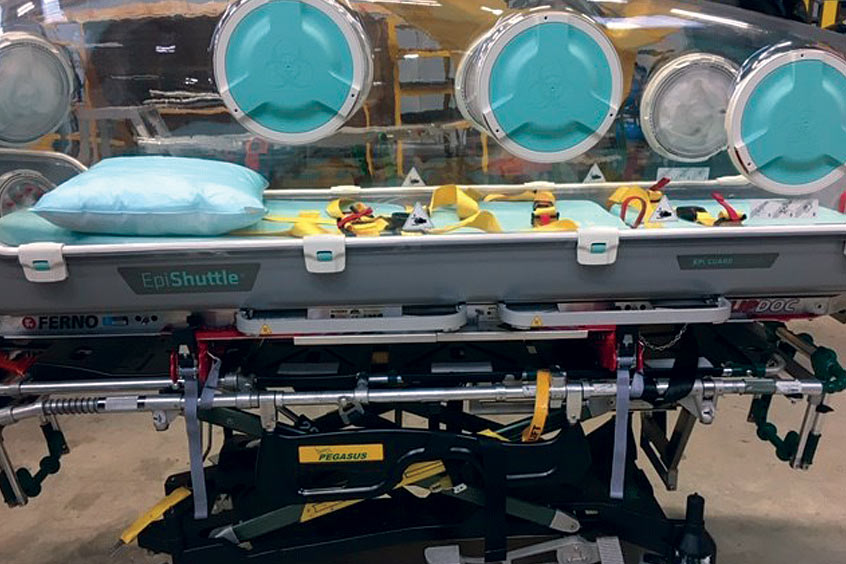
The Scottish Ambulance Service is utilising the latest medical technology to aid in the safe transfer of COVID-19 patients using air ambulance. The Epishuttle technology allows patients to be placed in a sealed adult sized incubator for transfer by air ambulance, providing protection for both patients and staff in complex cases.
To date, eight of these shuttles have been purchased, two of which have been received and are being tested for a go-live date on 3 April. A further two will be received on 17 April and another four by mid-May. The investment, of more than GBP500,000, will allow the SAS to ensure patients receive the highest possible standards of care whilst increasing capacity for complex transfers involving COVID-19 patients, such as those from remote and Island communities.
The Scottish Ambulance Service is working in partnership with Transport Scotland, Loganair and the RAF to increase the range of transport options available for COVID-19 transfers.
Pauline Howie, chief executive of the Scottish Ambulance Service, said: “This is an unprecedented situation and our staff across the country are doing a fantastic job in caring for patients across Scotland. The fight against COVID-19 has required the NHS to think differently and to move at pace. By adapting our approach and using this latest available technology, we are taking swift action in the best interests of patients and our hardworking staff whilst increasing our capacity. The introduction of Epishuttles will increase the range of options available to us as a service as we deal with COVID-19 cases, particularly for rural and island communities.
“I'd also like to thank our colleagues at Transport Scotland, Loganair and the RAF who have been offered fantastic assistance to us through aircraft and staff. It has been a real team effort and means we have the full range of resources available to us to enable us to react to any situation as we continue to help communities across Scotland in the months ahead."
Health Secretary Jeane Freeman adds: “We've been working closely with the Scottish Ambulance Service to significantly increase capacity for airlifting patients off the islands and to ensure that any patients from our island communities with COVID-19 can be transported to receive the appropriate healthcare when they need it. The first batch of Epishuttles will be available from this Friday, with plans well underway to increase the number of these single patient isolation pods in the coming weeks. Epishuttles are designed to protect patients and crew from potential infection and safely transport patients on fixed wing aircraft. In the meantime, SAS is working with the RAF, which is currently providing cover for transfers off the islands, using three Puma helicopters based at Kinloss, which can transfer some patients without Epishuttles.
“Our NHS is on an emergency footing and all health boards have been undertaking extensive work across Scotland to maximise the capacity available to manage expected rise in demand due to COVID-19. We can all play our part and ease pressure on services by staying at home, except for key workers, essential shopping, reasonable exercise or caring for the vulnerable.”
Further to a statement made by the Cabinet Secretary for Health, Loganair can confirm it is working closely with the Scottish Ambulance Service (SAS) to provide air ambulance capability as the service faces the unprecedented challenges borne by the COVID-19 outbreak.
A Loganair Twin Otter aircraft has been converted into an additional air ambulance aircraft, allowing it carry Epishuttle isolation pods for the safe carriage of patients by air.
As the Cabinet Secretary for Health outlined in her statement today, more of these pods have been acquired and will be in service soon.
With that in mind, Loganair is also now working to convert a larger Saab 340 aircraft, capable of operating into all Highlands and Islands airports with the exception of Barra, into an air ambulance with the capability to carry two Epishuttle pods and accompanying medical teams simultaneously. It is expected this aircraft will be available within the next seven days.
Barra, with its unique beach airport, will be served by the smaller Twin Otter.
The Loganair aircraft will be based at Glasgow Airport but are capable of operating throughout Scotland. Loganair pilots will be operating the aircraft as usual, and late last week, all received a special briefing from the airline and the Scottish Ambulance Service on the nature of the deployment.
Work has continued in Loganair's engineering and flight operations teams at Glasgow over the weekend and into this week to ensure full readiness of the aircraft ahead of full mission readiness from Friday 3 April.
Loganair's chief executive Jonathan Hinkles states: “The team effort to make this happen, moving from a concept to an operational solution in just a week, has been absolutely incredible. Between the SAS and Loganair teams, the concept, testing and training has all taken place, and we're also grateful for the support from the UK Civil Aviation Authority in progressing this project.
“Although the circumstances under which all of this work has been undertaken are ones that we'd never have wished to see, I'm heartened that the effort that has gone into this is truly admirable. We will support the Scottish Ambulance Service, the NHS and the island communities who rely on Loganair for their lifeline air services if and when our assistance is needed.”